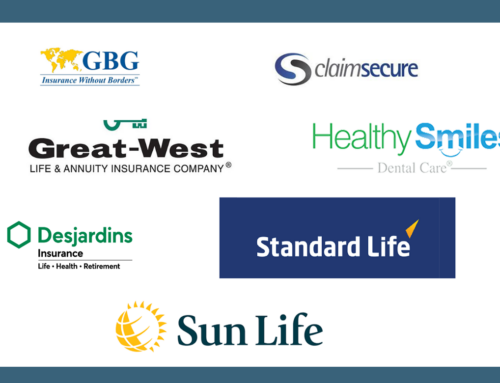Insurance Coverage: Different Types of Coverage and Options
Most Ontarians enjoy access to medical services, including prescriptions, annual doctor checkups and even complicated surgeries without ever receiving a bill. This is because of the Ontario Health Insurance Plan (OHIP), which provides a large percentage of residents with a laundry list of free healthcare services.
Health insurance is more complicated than simply showing up to an appointment, undergoing treatment and then handing over your health card. An insurance claim can be a convoluted process, complicated by the fact that there’s a lot that OHIP only partially covers or excludes.
With respect to dental services, coverage is extremely limited, meaning patients need to rely on their employer-sponsored group benefits plan or individual supplementary insurance. It’s important for people to understand how each of these insurance plans work. This way, they can receive the dental treatments they need and not unnecessarily pay out of pocket.
Let’s start by reviewing the ins and outs of both OHIP and employee group benefits to differentiate between the two. We’ll look at the dental treatments that are typically covered under both coverages. Additionally, we’ll look at the claims process to help you navigate around any potential delays or denials.
How Does OHIP Work?
In the early 1970s, Ontario implemented a healthcare system that is still widely considered to be a global leader. For qualified residents, OHIP provides free access to medical services, including non-elective surgeries, thousands of prescription medications and emergency care. Having a health card lets you visit a medical clinic, hospital or emergency room to receive the medical attention when needed. It’s about as stress-free as it can get especially when compared to other parts of the world.
What many don’t realize is that there are a lot of vital medical services that OHIP excludes or only partially covers. For instance, only a small portion of vision care is covered and certain vaccinations must be paid by the individual. Then there’s dentistry, which is only covered for surgeries performed in hospitals. This is a very small percentage of the dental care that most Ontarians receive every year, essentially making it a non-factor province-wide.
OHIP’s blind spot toward dentistry is odd and troubling. Oral care is a key component of one’s overall health and includes important services like oral cancer screening and replacement teeth. As of 2017, two to three million people have gone over a year without receiving dental care, and roughly one in six Canadians can’t afford dental services. This is of greater concern as many medical professionals believe there is a link between dental care and general health, evidenced by the direct connection between gum disease and diabetes.
Besides cost, there’s no concrete reason as to why OHIP ignores dental care. To fill in the healthcare gap, Ontarians need to invest in individual supplementary insurance or opt into an available group benefits plan provided by their employer.
What is Supplementary Dental Insurance?
Supplementary dental insurance is designed to complete one’s health coverage. This is an option for people who do not receive benefits from their employer and choose to buy a policy directly from an insurance provider.
Coverage varies based on the provider and prices are determined by an applicant’s health, medical history and family medical history, among other factors.
If you are interested in buying supplementary dental insurance, here are some dental or orthodontic treatments that you should look to be included in your coverage:
- Braces
- Gum treatment
- Coverage for your children
- Digital x-rays
- Laser dentistry
- Tooth extractions
- Dental bridges
- Root canals
- Dental exams
Some insurance providers allow you to build your coverage plan à la carte whereas others have packages. Not every service will be covered so have an in-depth conversation with several providers to find the plan that fits your budget but also offers the most comprehensive coverage.
Buying supplementary insurance is a way to receive medical and dental services at an affordable price by paying a monthly fee and, in some cases, a premium.
What are Group Benefits?
For some, OHIP provides sufficient health insurance to cover their annual checkups, prescriptions and hospital visits. Many Ontarians, though, lean on their employers to supplement their policies. These employer-sponsored plans are where most people receive their dental insurance.
Group benefits insures employees who choose to opt into the program. Regardless of medical history or what services they need, people are provided with the same benefits. These benefits usually extend to partners, spouses and children. An additional perk of group benefits is that employers often pay the premium leaving employees to only have a small amount deducted from their regular pay.
Group Benefits Coverage
Group benefits vary wildly based on what the employer chooses to pay for. Here is what is typically covered under the average health insurance plan:
- Dental care:
- Regular checkups and cleanings
- Oral surgeries
- Tooth extractions
- Root canals
- Bridges
- Dentures
- Other Medical Services:
- Prescription medication
- Semi-private hospital rooms
- Certain nursing services
- Ambulance services
- Prosthetics
- Medical equipment like wheelchairs
- Chiropractors
- Massage if performed by a RMT
- Optometrists and eyeglasses/contact lenses
- Podiatrists
- Physiotherapy
Sometimes group benefits are only offered to full-time staff. If you are a contract or part-time employee, ask your employer if there is any way you can participate in employee benefits. They will always be a less expensive choice than buying directly from a provider.
What is a Claim and How Does It Work?
Whether you have your own health insurance or partake in group benefits, you need to understand how a claim is processed so you know what to expect. The aim is to curb any delays or denials and to make sure you pay as little as possible for your dental care.
An insurance claim is a request by a person to their insurance company to be reimbursed for a medical or dental service that was provided.
Most claims go through a similar process:
- The insured submits the claim using the providers preferred method.
- The insurance provider investigates and validates the claim.
- The insurance provider might request additional evidence or supporting documentation. In some cases, an adjuster will be assigned to assess your claim.
- If the claim is successful, the insured will be reimbursed up to the amount that their coverage stipulates.
Make sure you keep the receipts from your medical and dental visits, because most providers require these to be included in claim submissions. Dental practices are unique in comparison to many doctor’s offices, including specialists, as most will submit the claim on behalf of the patient. They do most of the legwork meaning insured patients only must pay the difference (if they don’t have full coverage) and never have to deal with their insurance company.
Georgian Dental® Can Simplify the Process
Sorting through your insurance policy can be cumbersome and challenging. It’s not exactly an easy read.
We’re here to help! A member of our team of dental professionals would be happy to sit down with you to discuss our approach and services, and to review your insurance policy to help you understand what is covered and what is not. From there, we can tailor an oral care plan specifically for you.
Contact Georgian Dental® to book a free no-obligation consultation today!
Appointment Request
If you’re interested in any of our procedures, and would like to meet with one of our dentists to discuss options, costs and get additional information, complete this short form and we’ll give you a call to arrange for a no-obligation appointment at our Barrie clinic.










